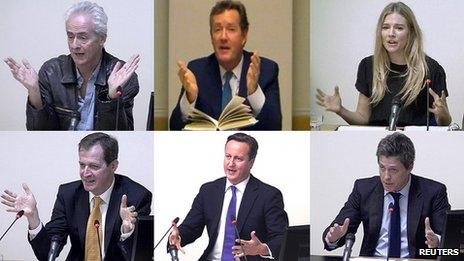Leveson Inquiry: What will come of judge's report?
- Published

For 25 weeks inside court 73, the trivial has jostled for attention alongside the serious
The Leveson Inquiry has imperilled Culture Secretary Jeremy Hunt's political career, and terminated the fledgling one once enjoyed by his adviser Adam Smith.
Its revelations embarrassed David Cameron and left ex-PM Tony Blair relieved he never had a mobile phone when he was in power.
The hearings have prompted politicians, proprietors and police officers to promise things will be better in the future.
But Lord Justice Leveson remains a troubled individual. Will his report end up gathering dust on the second shelf of an academic's bookcase?
Jeremy Paxman did little to assuage his concerns. When the judge articulated his worries, the Newsnight presenter replied, "as high as the second shelf?"
For 25 weeks inside court 73, the trivial has jostled for attention alongside the serious.
The testimony has featured a retired police horse; evidence has been heard from Piers Stefan Pughe-Morgan and Hugh John Mungo Grant; and the following celebrity magazine headline was considered: "Our men love our wobbly bits."
Long after that publication has been recycled, the words uttered by several of the victims of media malpractice will linger.
THE VICTIMS
Tempting as it might have been for some in the media, all of the victims' tales could not be discounted as the embittered evidence of celebrities who once courted the press they were now denigrating.
Margaret Watson came to tell how her son Alan killed himself after reading derogatory stories about his dead sister. He was found with cuttings of the offending articles in his hand.
Kate McCann told the inquiry that when the News of the World published her private diary - written while she searched for her missing daughter, Madeleine - she felt "totally violated".
"No respect was shown to me as a grieving mother," she said.
THE PRESS
The papers have been subjected to a scrutiny they normally inflict on others because the News of the World hacked the mobile phone of a murdered teenager, Milly Dowler. But these hearings delved much deeper.
Not all of the complaints could be explained away as belonging to a past era.
In 2010, Christopher Jefferies was wrongly arrested for the murder of Joanna Yeates. He argued he was subjected to a frenzied media campaign "to blacken his character".
Just four months ago, a photograph was published of nine-year-old Helena Bowles, who was mourning the death of her brother Sebastian, who had been killed in a Swiss coach crash. It was taken at a distance and without her knowledge.
Witness after newspaper witness insisted any aberrations were the work of a minority; standards were being improved and the freedom of the press should be sacrosanct.
Some may not have helped their cause. Richard Desmond, the owner of the Daily Express, said he did not quite know what the word "ethical" meant.
Paul McMullan provided a vivid account of the way some tabloids once operated. The former News of the World reporter recounted how having got a picture of a priest with a rent boy he had to run off through a nunnery at midnight in his underpants.
THE POLICE
Leveson has been painful for Scotland Yard. Even before the inquiry started, two senior officers had resigned because of phone hacking. A third employee went four months ago.
We learnt that the sons of two former commissioners secured work experience at the Sun; a third commissioner was helped by a senior editor at the News of the World when he was applying for the top post; and John Yates, once an assistant commissioner, faced accusations, which he denied, that a tabloid journalist plied him with champagne in return for stories.
THE POLITICIANS
Many will now wish they had been in Nick Clegg's position.
He sat at the "very end of the table" when he attended a dinner with Rupert Murdoch in 2009. It was, said the deputy prime minister, where "the children sit".
David Cameron was not treated the same and has paid a price for his "country suppers" with Rebekah Brooks and the texts he used to send her, which would end "DC LOL".
The prime minister, and his Labour predecessors Gordon Brown and Tony Blair, all insisted they did not do deals with Rupert Murdoch in return for his support.
THE FUTURE
The police are tightening up the rules relating to their dealings with the press.
Politicians are increasing the distance between themselves and proprietors.
The newspaper industry has accepted the status quo is unsustainable. The majority want self-regulation to continue. The talk is of a regulator with powers.
Lord Justice Leveson will deliver his report.
David Cameron then has to act. He will have to decide what to do - especially if the judge concludes self-regulation of the press cannot continue.
Any changes will need to answer a question Lord Justice Leveson posed at the start of this process:
"Who guards the guardians?"